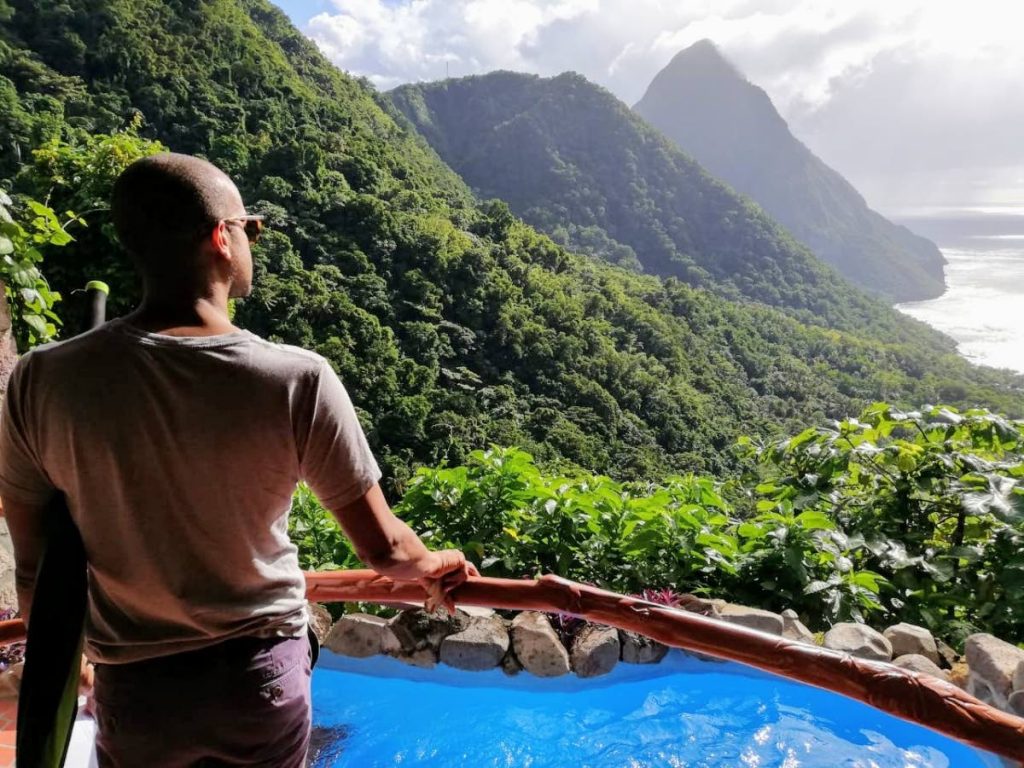St Lucia epitomises quandary of tourism

“Do the staff remind you of Get Out?” my wife asks, facetiously.
We’d just encountered another smiling hotel maid at a frighteningly expensive resort in St Lucia.
Ladera, whose open-air cabins overlook the Pitons UNESCO World Heritage site, is breathtakingly beautiful. The owner of the travel start-up who hooked me up with a short stay (travel-writing perks) said her fiance cried when he first saw the view.
The staff are super-friendly, constantly asking how everything is going and saying “the pleasure is all mine” after assisting you with something trivial. Could we ever imagine this attitude to customers in TT? It seems impossible. There is, however, the sense that when they turn away a tear of despair rolls down their cheek, like in Jordan Peele’s dark comedy-horror movie.
The power dynamics of foreign travel are often awkward. You want to tell hotel staff: don’t dissemble, just be yourself. Most awkward is when all the visitors are white and all the staff are black. It’s a “massa day” throwback that Trinbagonian staff might struggle with.
They will have to endure it to work at Sandals Tobago. The TT Hospitality and Tourism Institute produces 30 to 40 interns per year for Sandals resorts on other islands. If Sandals Tobago goes ahead, the Government will need to increase that number with GATE funding so that local people can be trained to fill the roles. The worry for those scrutinising the deal is that the Stewarts are paving the way to import their own staff en masse. Without local employment the Sandals project is worthless to Tobago, and our Tobagonian PM should insist on that being a red line.

In a jarringly honest travel piece about St Lucia, the British author Hanif Kureishi wrote: “One of the waiters took me aside to say…underneath this artificial paradise, the people were seething with fury, humiliated... Drive ten minutes and you soon find people living in primitive shacks…The first world has always used the third world as its playground…This often-comic recreation of colonialism–where ordinary whites can pretend to be aristocrats for a week – sells a stultified form of domination that generates more conflicts than it does solutions, creating an endless cycle of infantilisation, dependence and resentment.”
The allure of TT as a travel destination could never be this performance of subservience. Trinidadians don’t tone down their culture, as smaller islands often do, for fear of embarrassing or intimidating white tourists. TT culture is surface and celebrated. To find the real St Lucia you must look.
In Vieux Fort are the authentic sounds, sights and smells. The more clearly spoken French Creole of other parts of the island gives way to an African-sounding patois. People laugh or bicker in the streets. Maxi drivers begrudgingly break away from gossip or card games to take people home.
Driving through Castries’ bustling downtown streets we saw a brief fight involving a knife. Minutes away, giant cruise ships–like floating shopping malls–disgorged flip-flopped holidaymakers to buy fridge magnets.
Wandering the streets of Soufriere with its pretty French-style wooden houses we bumped into young children carol-singing, smelt fragrant marijuana and ate chicken cooked on a briquette barbecue for the equivalent of $40. It was divine.
At Boucan, a posh restaurant belonging to Hotel Chocolat, we paid far more and although it was money well-spent–all the food is cooked in chocolate–it was not quite as soul-enriching.
Hotel Chocolat is British-owned. Ladera is American-owned. Daily shuttles take you from Ladera through hundreds of acres of tropical rainforest to Sugar Beach–which is British-owned.
How do we measure benefits from Caribbean tourism when much of the money goes elsewhere?
A St Lucian working in the tourist industry told me Sandals supports locals by purchasing their products, providing good working conditions and being philanthropic to local schools. I was somewhat dubious.
Thankfully, we got to stay at a St Lucian-owned place too. Fond Doux’s cottages are nestled in lush gardens with walkways through fruit trees and flowers. Here too are throwbacks. It’s an 18th Century cocoa plantation, there are pictures of Prince Charles visiting and of the owner Eroline Lamontagne’s trip to Buckingham Palace to become a Member of the British Empire (MBE).
Tourism is vital to the St Lucian economy. TT is moving towards that place. When the day comes, we must be prepared. The money must stay here, employment must be local, the system must not degrade the workforce and the cultural exchange relationship must be above the kind of pomposity displayed by another Brit writer Alexander Gilmour, who wrote in the Financial Times: “It’s rare that you travel to a country and find that your family used to own it. In 1722, the king of England gave St Lucia to John, 2nd Duke of Montagu–my flesh and blood. Almost 300 years later, you can’t just invade St Lucia–times have changed. But would it be folly to buy a little piece of it?”


Comments
"St Lucia epitomises quandary of tourism"